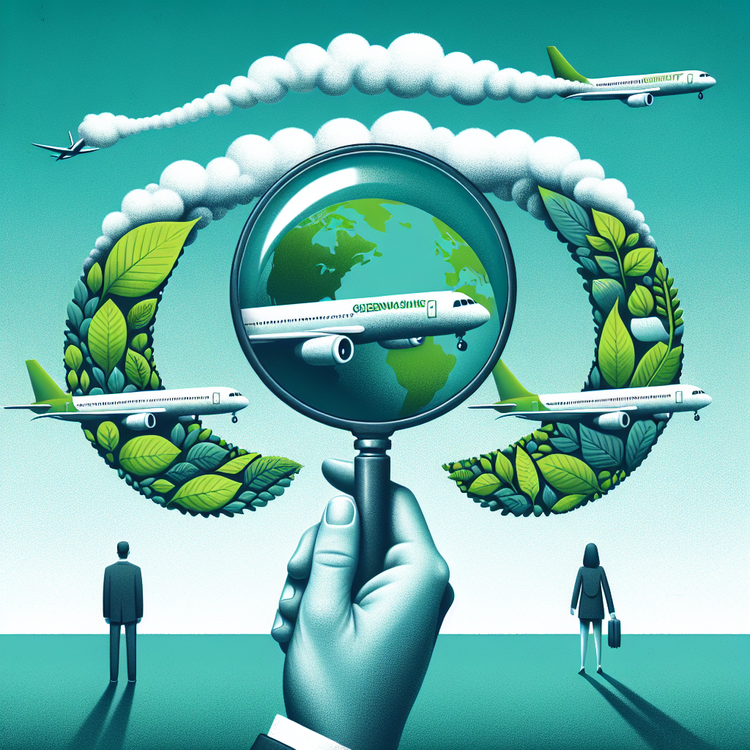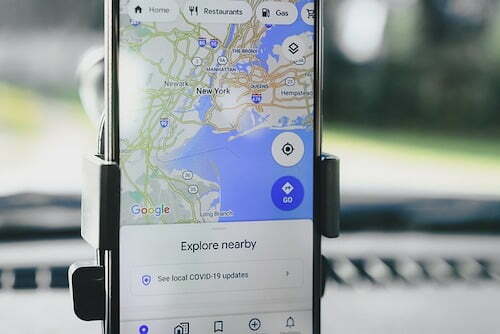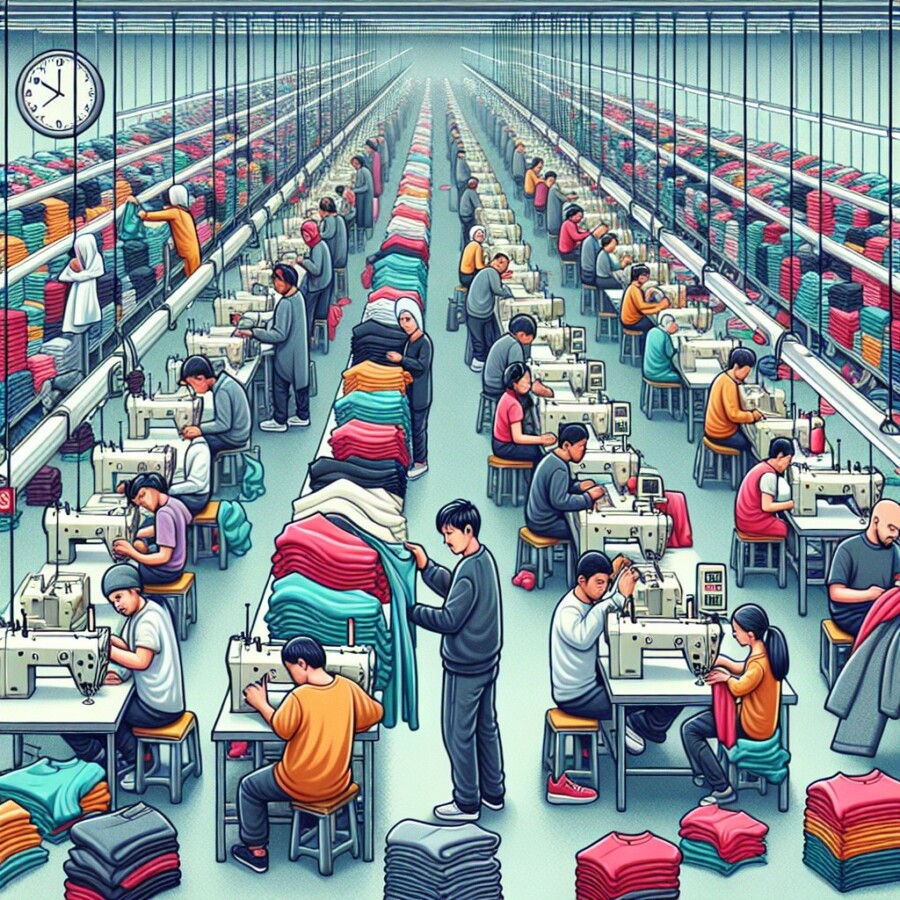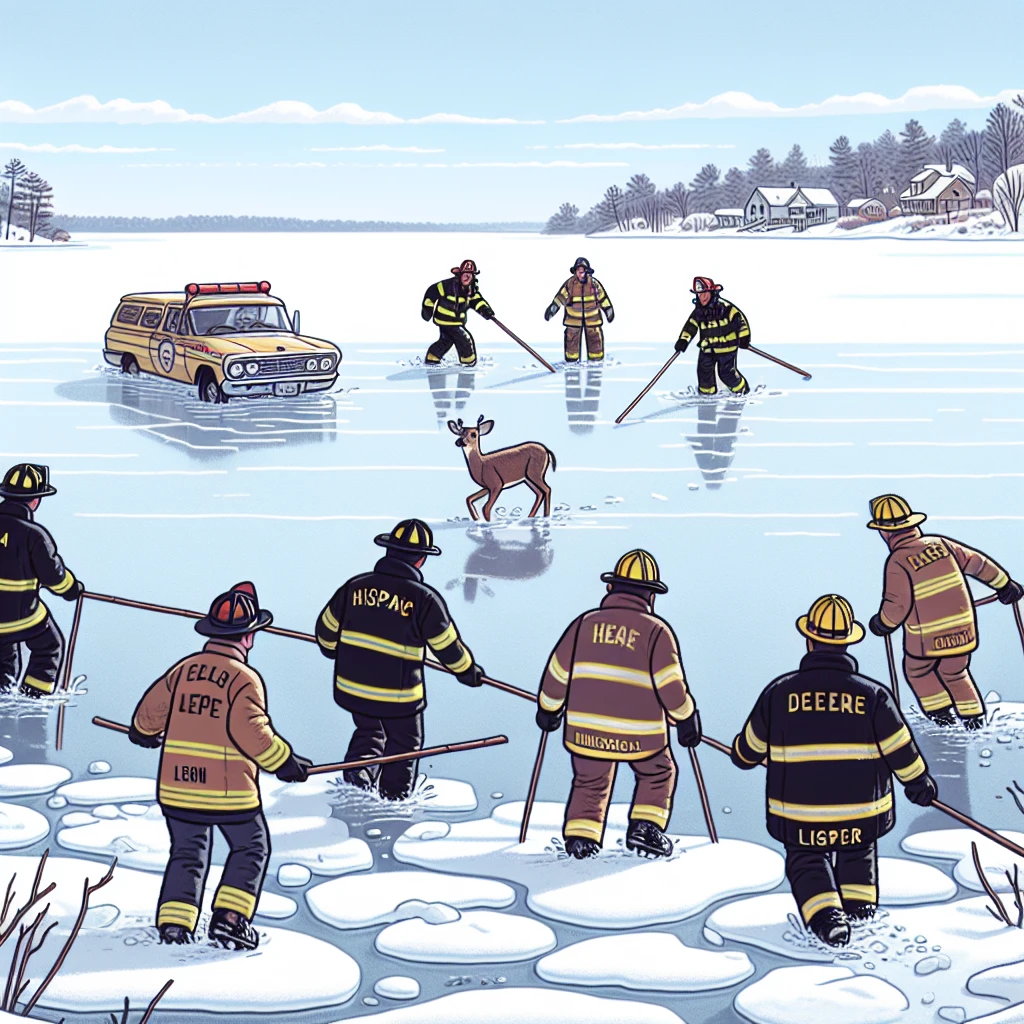Adverts for Air France, Lufthansa, and Etihad have been banned by the Advertising Standards Authority (ASA) for misleading consumers about the airlines’ environmental impact. The ASA found that the ads did not accurately depict the airlines’ contribution to climate change. Air France’s ad claimed to be committed to protecting the environment, while Lufthansa urged passengers to “fly more sustainably.” Etihad’s ad used the words “environmental advocacy.” The ASA investigates companies suspected of “corporate greenwashing,” which is when companies overstate their environmental friendliness.
Lufthansa explained that the phrase “fly more sustainably” referred to its “Green Fares” option, which uses sustainable aviation fuel and contributes to climate protection projects. The airline aims to be carbon neutral by 2050 and has decided to remove the phrase from future ads. Etihad Airways immediately removed all references to “environmental advocacy” from its ads after receiving the complaint. The ASA detected the misleading adverts using an artificial intelligence system designed to identify potential rule violations.
This is not the first time Lufthansa has been called out for greenwashing. In a previous campaign, the airline misled consumers into thinking it had already taken steps to minimize its environmental impact. The ASA upheld the decision, stating that air travel produces high levels of CO2 and non-CO2 emissions that contribute significantly to climate change. The ASA has also banned adverts from other companies, including Persil, HSBC, Shell, Innocent, Oatly, Golden Leaves, and JC Atkinson & Son, for greenwashing.
Companies are facing increasing scrutiny to reduce their carbon emissions, with airlines being particularly pressured to lower their environmental footprint. In November, a transatlantic flight powered solely by sustainable aviation fuels demonstrated that greener flying is possible. However, sustainable aviation fuels currently account for less than 0.1% of global aviation fuel consumption, and there are no dedicated commercial plants in the UK. The UK government plans to require 10% of aviation fuel to be sustainable by 2030.
Original news source: Airline adverts banned over ‘greenwashing’ claims (BBC)
Listen:
Slow
Normal
Fast
Vocabulary:
| 1 | greenwashing | The act of making false or exaggerated claims about the environmental benefits of a product or company |
| 2 | misleading | Giving the wrong idea or impression |
| 3 | environmental impact | The effect that human activities have on the environment, such as pollution or deforestation |
| 4 | carbon neutral | Achieving a balance between the amount of carbon emitted and the amount removed from the atmosphere |
| 5 | sustainable aviation fuel | Fuel made from renewable sources that can be used in airplanes |
| 6 | carbon emissions | The release of carbon dioxide and other greenhouse gases into the atmosphere |
| 7 | environmental footprint | The impact or influence that a person or organization has on the environment |
| 8 | sustainable | Able to be maintained or continued at a certain rate or level |
| 9 | aviation | Relating to or involved in flying or operating aircraft |
| 10 | transatlantic | Crossing or spanning the Atlantic Ocean |
| 11 | commercial plants | Facilities or factories that produce goods on a large scale for commercial purposes |
| 12 | scrutiny | Close examination or inspection |
| 13 | contribute | To give or supply something, such as money or effort, towards a cause or result |
| 14 | rule violations | Violations or breaches of established rules or regulations |
| 15 | artificial intelligence | The simulation of human intelligence in machines that are programmed to think and learn like humans |
Group or Classroom Activities
Warm-up Activities:
– News Summary
Instructions: Divide the class into pairs. Give each pair a few minutes to read the article. Then, have one person in each pair summarize the main points of the article to their partner. Afterward, have the pairs switch roles and summarize the article again. Encourage them to use their own words and focus on the key information.
– Opinion Poll
Instructions: Divide the class into small groups. Assign each group a specific airline from the article (Air France, Lufthansa, or Etihad). Have the groups discuss and debate their opinions on whether they believe the airline’s advertisements were misleading or not. Each group should come up with at least three reasons to support their opinion. Then, have each group share their opinions and reasons with the rest of the class.
– Vocabulary Pictionary
Instructions: Write down 10 key vocabulary words from the article on separate pieces of paper. Divide the class into teams. One person from each team will come to the front of the class and choose a word from the pile without showing it to their team. They must then draw a picture to represent the word while their team tries to guess the word. The first team to correctly guess the word gets a point. Continue until all the words have been drawn.
– Pros and Cons
Instructions: Divide the class into two groups. Assign one group to argue the pros of advertising an airline’s environmental friendliness, while the other group argues the cons. Give each group a few minutes to brainstorm their arguments. Then, have a debate where each group presents their arguments and counters the other group’s points. Encourage critical thinking and the use of evidence to support their claims.
– Future Predictions
Instructions: In pairs, have students discuss and make predictions about the future of airline advertising and environmental impact. They should consider how the pressure to reduce carbon emissions might affect the way airlines promote themselves. After a few minutes, have pairs share their predictions with the rest of the class. Encourage them to support their predictions with reasoning based on the article and their own knowledge.
Comprehension Questions:
1. What were the reasons for banning the adverts for Air France, Lufthansa, and Etihad?
2. How did Lufthansa explain the phrase “fly more sustainably”?
3. What did Etihad Airways do after receiving the complaint about their ad?
4. How did the ASA detect the misleading adverts?
5. Has Lufthansa been called out for greenwashing before?
6. Why did the ASA ban adverts from other companies for greenwashing?
7. What pressure are companies, especially airlines, facing in terms of carbon emissions?
8. What are the current statistics on the use of sustainable aviation fuels and the UK government’s plans for the future?
Go to answers ⇩
Listen and Fill in the Gaps:
Adverts for Air France, Lufthansa, and (1)______ have been banned by the Advertising Standards Authority (ASA) for misleading consumers about the airlines’ environmental (2)______. The ASA found that the ads did not accurately depict the airlines’ contribution to climate change. Air France’s ad (3)______ to be committed to protecting the environment, while Lufthansa urged passengers to “fly more sustainably.” Etihad’s ad used the words “environmental advocacy.” The ASA investigates (4)______ suspected of “corporate greenwashing,” which is when companies overstate their environmental friendliness.
Lufthansa (5)______ that the phrase “fly more sustainably” referred to its “Green Fares” (6)______, which uses sustainable aviation fuel and contributes to (7)______ protection projects. The airline aims to be carbon (8)______ by 2050 and has decided to remove the phrase from future ads. Etihad Airways immediately removed all references to “environmental advocacy” from its ads after receiving the complaint. The ASA detected the misleading adverts using an artificial intelligence system designed to identify potential rule violations.
This is not the first time Lufthansa has been called out for greenwashing. In a previous campaign, the (9)______ misled consumers into thinking it had already (10)______ steps to minimize its environmental impact. The ASA upheld the decision, stating that air travel produces high (11)______ of CO2 and non-CO2 emissions that contribute significantly to climate change. The ASA has also banned adverts from other companies, including Persil, HSBC, (12)______, Innocent, Oatly, Golden Leaves, and JC Atkinson & Son, for greenwashing.
Companies are (13)______ increasing scrutiny to reduce their carbon emissions, with airlines being particularly pressured to lower their environmental (14)______. In November, a transatlantic flight (15)______ solely by sustainable aviation fuels demonstrated that (16)______ flying is possible. However, sustainable aviation fuels currently account for less than 0.1% of global aviation fuel consumption, and there are no dedicated commercial plants in the UK. The UK government plans to require 10% of aviation fuel to be sustainable by 2030.
Go to answers ⇩
Discussion Questions:
Students can ask a partner these questions, or discuss them as a group.
1. What is your opinion on companies that engage in greenwashing?
2. How would you feel if you discovered that an advertisement you believed was environmentally friendly was actually misleading?
3. Do you think it’s important for companies to be transparent about their environmental impact? Why or why not?
4. Have you ever been influenced by an advertisement that claimed to be environmentally friendly? How did you feel when you found out it was misleading?
5. What steps do you think companies should take to ensure they are not engaging in greenwashing?
6. How do you think the use of artificial intelligence to detect misleading advertisements will impact the advertising industry?
7. Do you think the ASA’s decision to ban these advertisements will have a significant impact on the airlines’ reputations? Why or why not?
8. How do you think the increasing scrutiny on companies to reduce their carbon emissions will affect the future of advertising?
9. What measures do you think airlines should take to lower their environmental footprint?
10. Have you ever made a purchasing decision based on a company’s environmental claims? How important are these claims to you?
11. Do you think sustainable aviation fuels will become more widely used in the future? Why or why not?
12. How do you think the UK government’s plan to require 10% of aviation fuel to be sustainable by 2030 will impact the airline industry?
13. How would you feel if you discovered that a company you regularly supported was engaging in greenwashing?
14. Do you think consumers have a responsibility to research and verify companies’ environmental claims before making a purchase? Why or why not?
15. What role do you think advertising plays in shaping public perception of a company’s environmental impact?
Individual Activities
Vocabulary Meanings:
Match each word to its meaning.
Words:
1. greenwashing
2. misleading
3. environmental impact
4. carbon neutral
5. sustainable aviation fuel
6. carbon emissions
7. environmental footprint
8. sustainable
9. aviation
10. transatlantic
11. commercial plants
12. scrutiny
13. contribute
14. rule violations
15. artificial intelligence
Meanings:
(A) Giving the wrong idea or impression
(B) Violations or breaches of established rules or regulations
(C) Close examination or inspection
(D) To give or supply something, such as money or effort, towards a cause or result
(E) Achieving a balance between the amount of carbon emitted and the amount removed from the atmosphere
(F) The impact or influence that a person or organization has on the environment
(G) Fuel made from renewable sources that can be used in airplanes
(H) The release of carbon dioxide and other greenhouse gases into the atmosphere
(I) The simulation of human intelligence in machines that are programmed to think and learn like humans
(J) Able to be maintained or continued at a certain rate or level
(K) Relating to or involved in flying or operating aircraft
(L) The act of making false or exaggerated claims about the environmental benefits of a product or company
(M) Facilities or factories that produce goods on a large scale for commercial purposes
(N) Crossing or spanning the Atlantic Ocean
(O) The effect that human activities have on the environment, such as pollution or deforestation
Go to answers ⇩
Multiple Choice Questions:
1. What is the Advertising Standards Authority (ASA) investigating in relation to the airlines’ ads?
(a) Consumer complaints
(b) Misleading pricing
(c) False advertising
(d) Corporate greenwashing
2. Which airline claimed to be committed to protecting the environment?
(a) Lufthansa
(b) Air France
(c) Etihad
(d) None of the above
3. What did Lufthansa’s ad encourage passengers to do?
(a) Fly less frequently
(b) Fly with a different airline
(c) Fly more sustainably
(d) None of the above
4. How did Etihad Airways respond to the complaint about their ad?
(a) They defended their claims
(b) They apologized and offered refunds to customers
(c) None of the above
(d) They immediately removed all references to “environmental advocacy”
5. What technology did the ASA use to detect the misleading adverts?
(a) Human investigators
(b) Social media monitoring
(c) Artificial intelligence system
(d) None of the above
6. What did the ASA find about Lufthansa’s previous campaign?
(a) It misled consumers about its environmental impact
(b) It accurately depicted the airline’s contribution to climate change
(c) It promoted sustainable aviation fuels
(d) None of the above
7. Which of the following companies has NOT been banned by the ASA for greenwashing?
(a) Persil
(b) HSBC
(c) Shell
(d) Innocent
8. What percentage of global aviation fuel consumption is currently accounted for by sustainable aviation fuels?
(a) 10%
(b) Less than 0.1%
(c) 50%
(d) None of the above
Go to answers ⇩
True or False Questions:
1. Lufthansa has never been called out for greenwashing in a previous campaign.
2. Airlines are not facing any pressure to lower their environmental footprint and reduce carbon emissions.
3. Etihad Airways removed all references to “environmental advocacy” from its ads after receiving a complaint.
4. The Advertising Standards Authority (ASA) has approved adverts from Air France, Lufthansa, and Etihad which accurately inform consumers about their environmental impact.
5. The ASA has also banned adverts from other companies, including Persil, HSBC, Shell, Innocent, Oatly, Golden Leaves, and JC Atkinson & Son, for greenwashing.
6. The ASA used an artificial intelligence system to identify potential rule violations in the adverts.
7. The ASA found that the ads accurately represent the airlines’ contribution to climate change.
8. Lufthansa’s ad encouraged passengers to “fly more sustainably” but was deemed misleading by the ASA.
Go to answers ⇩
Write a Summary:
Write a summary of this news article in two sentences.
Check your writing now with the best free AI for English writing!
Writing Questions:
Answer the following questions. Write as much as you can for each answer.
Check your answers with our free English writing assistant!
1. What was the reason behind the banning of the adverts for Air France, Lufthansa, and Etihad?
2. How did Lufthansa explain the phrase “fly more sustainably” in their ad?
3. Why did Etihad Airways remove all references to “environmental advocacy” from their ads?
4. What is greenwashing and why are companies being investigated for it?
5. What percentage of global aviation fuel consumption is currently made up of sustainable aviation fuels?
Answers
Comprehension Question Answers:
1. The adverts were banned because they were found to be misleading consumers about the airlines’ environmental impact.
2. Lufthansa explained that the phrase “fly more sustainably” referred to its “Green Fares” option, which uses sustainable aviation fuel and contributes to climate protection projects.
3. Etihad Airways immediately removed all references to “environmental advocacy” from its ads after receiving the complaint.
4. The ASA detected the misleading adverts using an artificial intelligence system designed to identify potential rule violations.
5. Yes, Lufthansa has been called out for greenwashing before in a previous campaign where it misled consumers about minimizing its environmental impact.
6. The ASA banned adverts from other companies for greenwashing because they overstated their environmental friendliness.
7. Companies, especially airlines, are facing pressure to reduce their carbon emissions and lower their environmental footprint.
8. Currently, sustainable aviation fuels account for less than 0.1% of global aviation fuel consumption and there are no dedicated commercial plants in the UK. However, the UK government plans to require 10% of aviation fuel to be sustainable by 2030.
Go back to questions ⇧
Listen and Fill in the Gaps Answers:
(1) Etihad
(2) impact
(3) claimed
(4) companies
(5) explained
(6) option
(7) climate
(8) neutral
(9) airline
(10) taken
(11) levels
(12) Shell
(13) facing
(14) footprint
(15) powered
(16) greener
Go back to questions ⇧
Vocabulary Meanings Answers:
1. greenwashing
Answer: (L) The act of making false or exaggerated claims about the environmental benefits of a product or company
2. misleading
Answer: (A) Giving the wrong idea or impression
3. environmental impact
Answer: (O) The effect that human activities have on the environment, such as pollution or deforestation
4. carbon neutral
Answer: (E) Achieving a balance between the amount of carbon emitted and the amount removed from the atmosphere
5. sustainable aviation fuel
Answer: (G) Fuel made from renewable sources that can be used in airplanes
6. carbon emissions
Answer: (H) The release of carbon dioxide and other greenhouse gases into the atmosphere
7. environmental footprint
Answer: (F) The impact or influence that a person or organization has on the environment
8. sustainable
Answer: (J) Able to be maintained or continued at a certain rate or level
9. aviation
Answer: (K) Relating to or involved in flying or operating aircraft
10. transatlantic
Answer: (N) Crossing or spanning the Atlantic Ocean
11. commercial plants
Answer: (M) Facilities or factories that produce goods on a large scale for commercial purposes
12. scrutiny
Answer: (C) Close examination or inspection
13. contribute
Answer: (D) To give or supply something, such as money or effort, towards a cause or result
14. rule violations
Answer: (B) Violations or breaches of established rules or regulations
15. artificial intelligence
Answer: (I) The simulation of human intelligence in machines that are programmed to think and learn like humans
Go back to questions ⇧
Multiple Choice Answers:
1. What is the Advertising Standards Authority (ASA) investigating in relation to the airlines’ ads?
Answer: (d) Corporate greenwashing
2. Which airline claimed to be committed to protecting the environment?
Answer: (b) Air France
3. What did Lufthansa’s ad encourage passengers to do?
Answer: (c) Fly more sustainably
4. How did Etihad Airways respond to the complaint about their ad?
Answer: (d) They immediately removed all references to “environmental advocacy”
5. What technology did the ASA use to detect the misleading adverts?
Answer: (c) Artificial intelligence system
6. What did the ASA find about Lufthansa’s previous campaign?
Answer: (a) It misled consumers about its environmental impact
7. Which of the following companies has NOT been banned by the ASA for greenwashing?
Answer: (a) Persil
8. What percentage of global aviation fuel consumption is currently accounted for by sustainable aviation fuels?
Answer: (b) Less than 0.1%
Go back to questions ⇧
True or False Answers:
1. Lufthansa has never been called out for greenwashing in a previous campaign. (Answer: False)
2. Airlines are not facing any pressure to lower their environmental footprint and reduce carbon emissions. (Answer: False)
3. Etihad Airways removed all references to “environmental advocacy” from its ads after receiving a complaint. (Answer: True)
4. The Advertising Standards Authority (ASA) has approved adverts from Air France, Lufthansa, and Etihad which accurately inform consumers about their environmental impact. (Answer: False)
5. The ASA has also banned adverts from other companies, including Persil, HSBC, Shell, Innocent, Oatly, Golden Leaves, and JC Atkinson & Son, for greenwashing. (Answer: True)
6. The ASA used an artificial intelligence system to identify potential rule violations in the adverts. (Answer: True)
7. The ASA found that the ads accurately represent the airlines’ contribution to climate change. (Answer: False)
8. Lufthansa’s ad encouraged passengers to “fly more sustainably” but was deemed misleading by the ASA. (Answer: True)
Go back to questions ⇧















